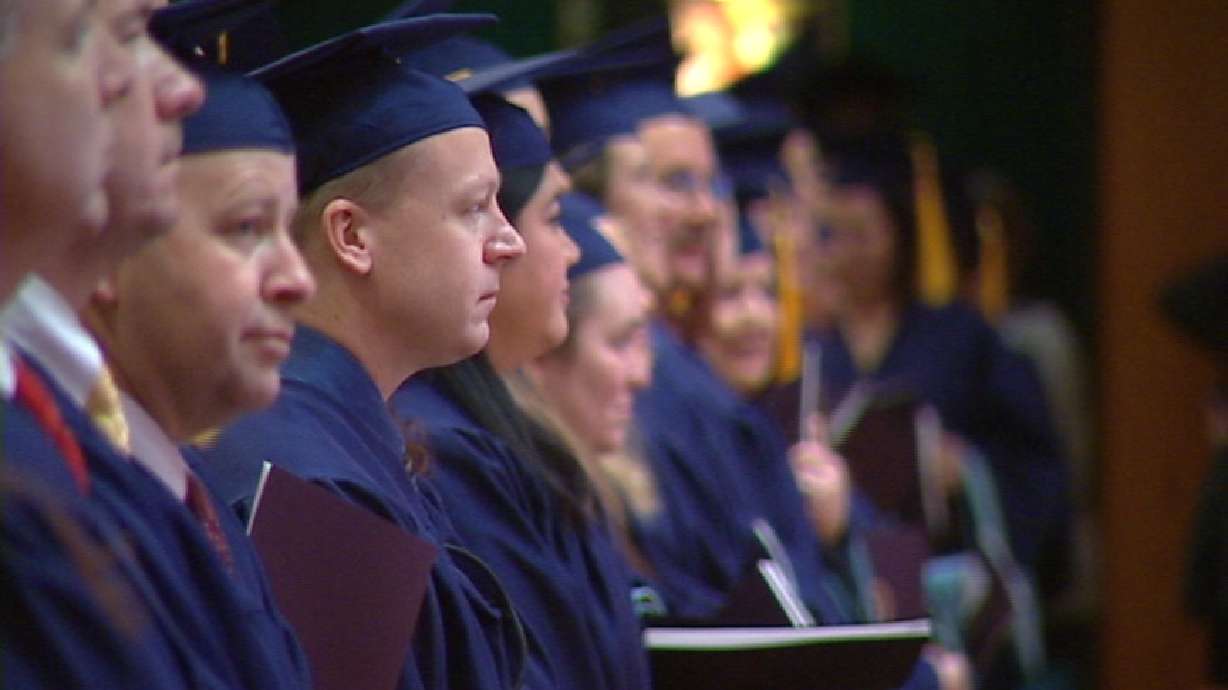Estimated read time: 3-4 minutes
This archived news story is available only for your personal, non-commercial use. Information in the story may be outdated or superseded by additional information. Reading or replaying the story in its archived form does not constitute a republication of the story.
SALT LAKE CITY -- A degree doesn't guarantee a job and never has it been more true than now.
The newest U.S. Bureau of Labor Statistics' Current Population Survey, shows the unemployment rate for college graduates between the ages of 20- to 24-year-olds reached 12.1 percent, compared to the overall unemployment rate of 9.2 percent.
When graduates do find a job during a recession, studies show that their annual income will remain lower throughout their lives than those who entered the workforce during an economic boom.
Lisa Kahn, an economist at Yale, studied the impact of recession on the lifetime earnings of young people. She found that the starting income for graduates who began working during the 1981-82 recession was as much as 7 percent lower than those who entered during a regular economic time and in their first year, they made about 25 percent less than others.
In percentages:
- College graduates 4.4
- Associate degree holders 8.4
- College dropouts 8.4
- High school graduates 10.7
- High school dropouts 14.1
Surprisingly, the disadvantage held throughout those graduates' careers.
"Seventeen years after graduation, those who had entered the workforce during inhospitable times were still earning 10 percent less on average than those who had emerged into a more bountiful climate," reports Don Peck of The Atlantic. "When you add up all the earnings losses over the years, Kahn says, it's as if the lucky graduates had been given a gift of about $100,000, adjusted for inflation, immediately upon graduation—or, alternatively, as if the unlucky ones had been saddled with a debt of the same size."
Degree holders do fare better than those without, as unemployment in construction and manufacturing industries is 20.6 percent and 10.6 percent respectively. Of those who are 20- to 24-years-old, the total unemployment rate is 15.5 percent.
College graduates may have additional burdens than those who did not attend college avoided -student loans.
According to the Financial Aid website, "two-thirds (65.6 percent) of 4-year undergraduate students graduated with a Bachelor's degree and some debt in 2007-08 and the average student loan debt among graduating seniors was $23,186."
The type of loan and scholarship award varies the number for each student, but for many, paying out-of-pocket is their only option. After graduation and accumulating the debt to get there, 85 percent of 2011 graduates find themselves moving back home. Many are working part time or jobs that are irrelevant to their degrees.
In percentages:
- 2005 -- 11.0, 5.1
- 2006 -- 11.2, 4.6
- 2007 -- 10.8, 4.6
- 2008 -- 14.0, 5.8
- 2009 -- 18.5, 9.3
- 2010 -- 19.1, 9.6
The problem, The Foundry concludes , is not layoffs, but low hiring. For those trying to find their first job, this is an immense hindrance.
While corporate jobs continue to be scarce, interest has surged in public service. In 2009, 16 percent more young college graduates worked for the federal government than in the previous year and 11 percent more for nonprofit groups, reports the New York Times.
"Perhaps President Obama indeed made public service ‘cool' as he had promised during his presidential campaign. Some experts say millennials — those who grew up in the 1990s or the 21st century — are unusually big-hearted, maybe because of the community service requirements they had in school."
Either way, they add, these millennials are more interested in making a difference than earning a big paycheck and service jobs may provide alternatives to corporate jobs that college graduates traditionally seek.
Some experts suggest that "casting a wide net" in job considerations and "resisting the temptation to see graduate school as a guaranteed refuge during rough economic times" may help young graduates procure a job, reports the Huffington Post.
Graduate school may cause additional debt that won't pay out in immediate earnings at this point.









